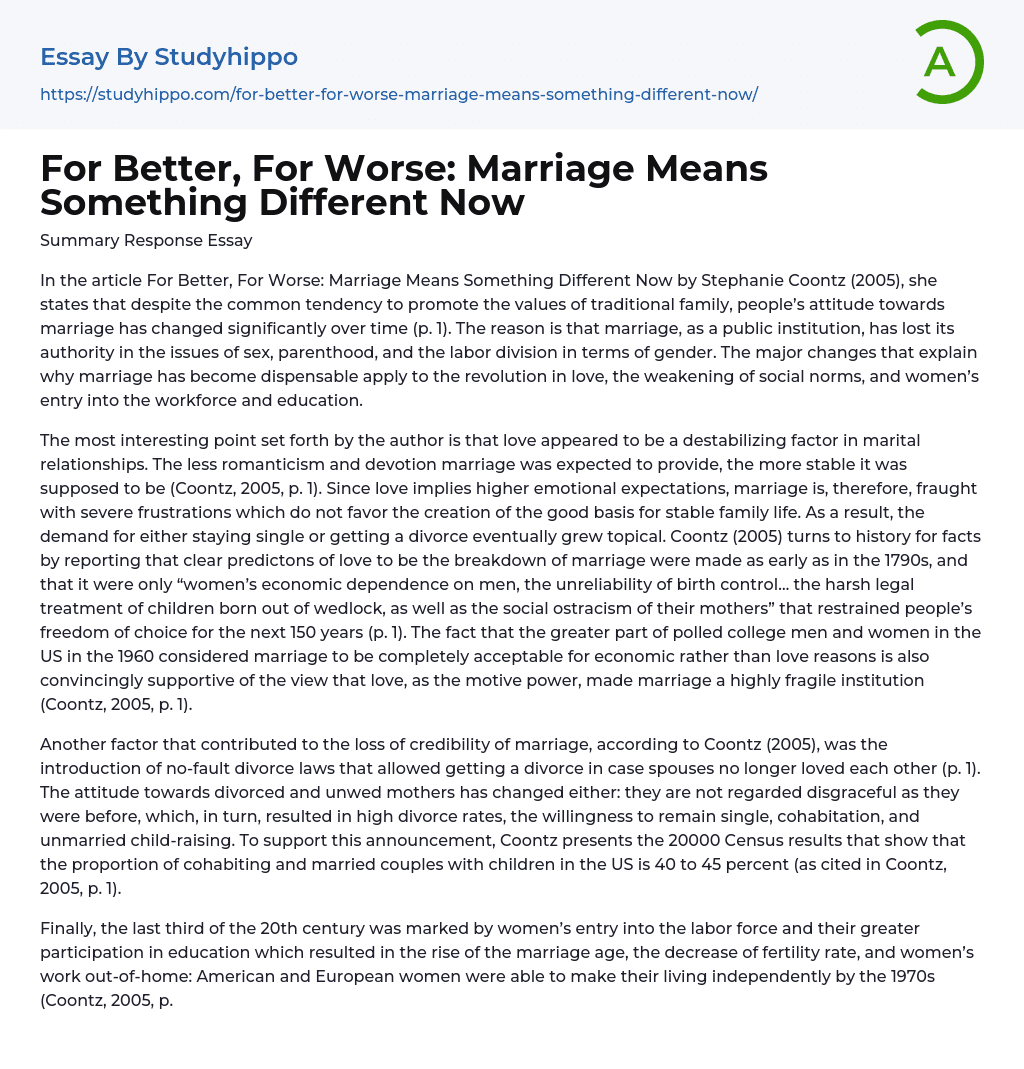

For Better, For Worse: Marriage Means Something Different Now Essay Example
Summary Response Essay
In the article For Better, For Worse: Marriage Means Something Different Now by Stephanie Coontz (2005), she states that despite the common tendency to promote the values of traditional family, people’s attitude towards marriage has changed significantly over time (p. 1). The reason is that marriage, as a public institution, has lost its authority in the issues of sex, parenthood, and the labor division in terms of gender. The major changes that explain why marriage has become dispensable apply to the revolution in love, the weakening of social norms, and women’s entry into the workforce and education.
The most interesting point set forth by the author is that love appeared to be a destabilizing factor in marital relationships. The less romanticism and devotion marriage was expected to provide,
...the more stable it was supposed to be (Coontz, 2005, p. 1). Since love implies higher emotional expectations, marriage is, therefore, fraught with severe frustrations which do not favor the creation of the good basis for stable family life. As a result, the demand for either staying single or getting a divorce eventually grew topical. Coontz (2005) turns to history for facts by reporting that clear predictons of love to be the breakdown of marriage were made as early as in the 1790s, and that it were only “women’s economic dependence on men, the unreliability of birth control… the harsh legal treatment of children born out of wedlock, as well as the social ostracism of their mothers” that restrained people’s freedom of choice for the next 150 years (p. 1). The fact that the greater part of polled college men and women in the
US in the 1960 considered marriage to be completely acceptable for economic rather than love reasons is also convincingly supportive of the view that love, as the motive power, made marriage a highly fragile institution (Coontz, 2005, p. 1).
Another factor that contributed to the loss of credibility of marriage, according to Coontz (2005), was the introduction of no-fault divorce laws that allowed getting a divorce in case spouses no longer loved each other (p. 1). The attitude towards divorced and unwed mothers has changed either: they are not regarded disgraceful as they were before, which, in turn, resulted in high divorce rates, the willingness to remain single, cohabitation, and unmarried child-raising. To support this announcement, Coontz presents the 20000 Census results that show that the proportion of cohabiting and married couples with children in the US is 40 to 45 percent (as cited in Coontz, 2005, p. 1).
Finally, the last third of the 20th century was marked by women’s entry into the labor force and their greater participation in education which resulted in the rise of the marriage age, the decrease of fertility rate, and women’s work out-of-home: American and European women were able to make their living independently by the 1970s (Coontz, 2005, p. 1). Based on the above factors, the author does not see any point in “preaching the benefits of marriage”, since marriage, in its strictly traditional form, no longer meets the demands of the modern society (Coontz, 2005, p. 2).
In conclusion, Stephanie Coontz distinguishes three main factors that contributed to the process of the transformation of marriage: putting the value of love above other values in marriage, moderating the
social stigma, and expanding women’s role in the society. By recognizing the fact that conventional marriage has lost its positions, the author makes the reader look critically at the important social aspects behind standard piety that is so characteristic of the issue of marriage.
- Adoption essays
- Aunt essays
- Babies essays
- Bedroom essays
- Caring essays
- Children essays
- Daughter essays
- Divorce essays
- Dog essays
- Dysfunctional Family essays
- Family Tradition essays
- Family Values essays
- Father essays
- Foster Care essays
- Friends essays
- Grandparent essays
- Home essays
- Hometown essays
- Husband essays
- Jealousy essays
- Love essays
- Marriage essays
- Mother essays
- Online Dating essays
- Parenting essays
- Parenting Teens essays
- Parents essays
- Relationship essays
- Room essays
- Sibling essays
- Sister essays
- Wedding essays
- Wife essays



